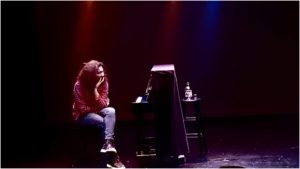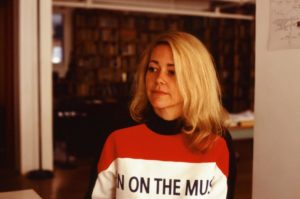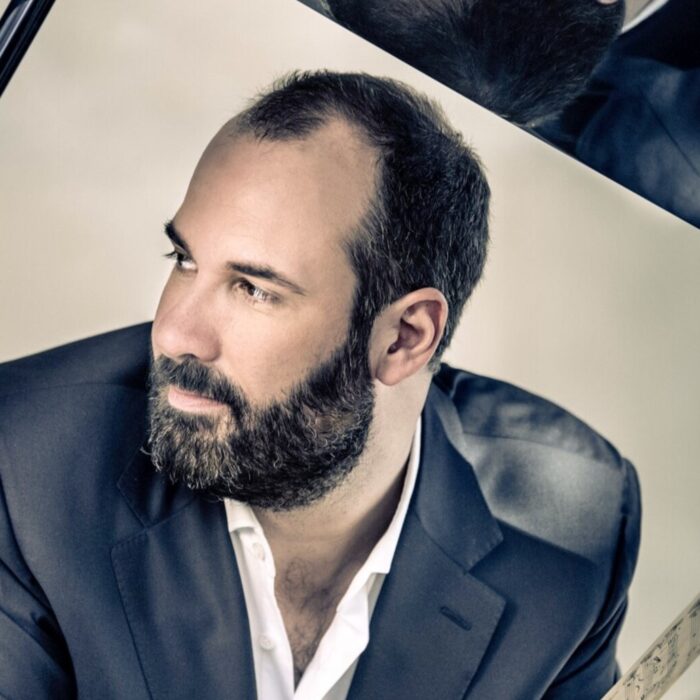
Q & A: Composer Felix Jarrar on the Process of Creating ‘Otter Creek’ & ‘Ulster County’
By Jennifer PyronFelix Jarrar is a young composer in his 20s, based in NY, that expresses the value of deep experiences and encourages the healing concept of what it means to live from a more vulnerable place, just as you are.
While recently debuting his newest works at “Tada!” in NOMAD, OperaWire took a moment to visit with him about his creative process, life journeys and how his ultimate legacy, as an LGBTQ+ supporter, is vitally important to the expansive qualities of self-realization, as a human being in our world, through opera and art song.
OperaWire: I feel your work is like a breath of fresh air and am curious about your creative process. How are you able to create new work that mirrors who you are by documenting your personal experiences with drama that encourages new perspectives through self-realization?
Felix Jarrar: I primarily create vocal music in this way. As of now, I have 12 operas and almost 200 art songs. I enjoy composing nine movement structures with two alternating singers and I feel like this is my form because it feels very natural to me. For example, “Ulster County,” which is my newest work, highlights the first volume that I wrote in 2019 while I was a graduate student at Brooklyn College. “Otter Creek,” which I wrote this past summer, bridges the gap after “Ulster County” to create, what I always thought would be cool to do, a jukebox musical concept where I had the options of putting a volume one with a volume two, and so on. I like this idea of having options around tailoring my song cycles in their own essence as these pieces that then become immersive. This has been my overall design in mind while discovering my essence through my work and why I do what I do. I love immersive theater because it involves the audience in a deeper way.
Also, both of these works are about nature, which is my ultimate inspiration. I lived in Vermont for four years and discovered a pure approach to express myself through my work especially during this time. There are a lot of LGBTQ+ issues that are underlying throughout everything I write, and I want to give insight as a way to self-realization that feels natural and open to all forms of expression. This is the essence of my work because this is my life. I work a lot with librettist Bea Goodwin and she has influenced a lot of what I do, even if she is not on the project with me. She does a lot of immersive theater and I learned how to create presets for my shows by her example.
I really enjoy the idea of an audience walking into a simulated musical experience that is a discovery process. For example, three of the nine song cycles I have written are for tenor and baritone. This represents two sides of my personality that vary based on the mood of the piece. The tenor in “Ulster County” and “Otter Creek” is the longing and desirous side of me, and the baritone is much more independent and exact in his ultimate choice of being alone. This is about an experience that I had, in my past, about being devastated over someone leaving my life. It was not a relationship but it brought into the light a new level of romantic feelings for me. I feel like this is relatable to many people, in many ways. “Ulster County” faces these feelings head-on and “Otter Creek” is the resolution to be done with the devastating feelings and to move forward in a newfound freedom.
OW: When do you find yourself writing the most about an experience? Does the process need to be fully realized before you start? Or are you writing as you are living it out?
FJ: “Otter Creek” is a great example of how I felt this excitement towards my own life and made the decision to live and have fun again. I was really inspired during my last summer in Vermont after skinny dipping with friends and had this awakening about what it means to experience nature as a way of life and community. My inspiration began while we were driving to Fern Lake and got lost. I had this moment where there was this clarity stirring inside of me and I felt the need to create a way for myself to experience the chaos before peace arrived. I also learned that my grandma died during this time and so I felt that everything was leading me into something greater than I could possibly imagine. It was like I was lost in my emotions and knew that clarity as resolution to be at peace would be the only way out. I began writing and had finished my work half-way through the experience. Everything was pouring out of me.
OW: Have you always been a journaling composer in this way?
FJ: My friends love to make suggestions after we have moments that could inspire me to write and as much as I try to not write about everything that does happen, I can’t help but give myself up to the connectivity that happens creatively while I am living my life. I laugh when I realize I have written half of a new work after just one moment in this way. It is my work’s immersive concept being lived in real time. This is my life and who I am.
I love how art songs tell stories. My song cycles represent the journeys I have been on and I want to share these works in order to mark them as a way for audiences to live in the moment with me.
OW: How do you begin composing your art songs? Are you at the piano and singing into the music you hear? Or do you write the libretto that then creates the music to tell the story? Basically, does the music or do the words come first for you?
FJ: I have a different process for when I write operas versus when I write songs. For art songs, the text is a passive voice that is at the service of a concert and the collaboration in a concert setting. For operas, the text is about the dramaturgy and timing that influences the lighting, staging and overall production that an opera is.
When I compose an art song it begins as a lyrical idea like when I composed “Ulster County’s” first songs that were a gateway into my mindset and everything that was going on in life. I was in Ulster County for a gig with a rockband and found a lot of peace while I was there doing my work. I wrote a lot about sadness, loneliness, and seeking peace within these feelings because being in sadness alone was better than being in a lot of chaos and surrounded by a lot of people. It was a horribly depressing feeling that not a lot of people like to talk about, but that I needed to go through in my mind and my work. From this point, I then created two singers, the tenor and baritone, that would represent the right and left sides of my brain and eventually intersect and represent the resolution to be at peace with the process. The staging of this was centered around the two singers reading from binders to represent reading from the diary that I kept to document my experience. At one point there is a song called “What He Told Me” that is derived from the emails I received from my love interest and how I choose to play this moment out through text. This is my way of taking the experience and then reclaiming that which I choose to learn from and share in my work.
OW: At the end of “Ulster County,” I remember there being a song that shifted into a totally new perspective and felt like a repurposed conclusion. Can you speak more into this moment and what this meant for you in your experience?
FJ: “Into the Light” is the song and it always makes me feel really emotional because it is a very vulnerable piece. It is probably my favorite song in this cycle. For me, this is a moment where I’ve had all this stuff happen and discovered this vulnerability inside of me as my way to move forward. In this song cycle, there are many moments of lumination that when I arrive at “Into the Light,” it becomes more human. It is my way of connecting to how we are all human beings experiencing emotions that take us into our next journey every moment.
I also used to love going on walks when I was in college and hiking trails in Vermont that made me feel like I was always walking into new moments of clarity within me. “Into the Light” speaks about dreams that I was too scared to say before I had that moment and what it feels like to put yourself out there. My work is a living example of my vulnerability in real life and the words that I share will hopefully inspire others to live in their truth too.
Here are Felix’s lyrics from “Into the Light.” May we all be more inspired to be who we already are***
“Into the Light” (Tenor)
I waved my white flag above my head,
I was done with the show,
I was a poor lost wanderer,
I could think of no place to go.
Until I walked into the light,
That evaded me for so long,
I left the drama of the stage behind,
Leaving my enemies and their wrongs,
I’ve lost so much that is dear to me,
The fear of failure largely loomed me over,
Into the abyss until the light broke clear,
I began to feel some closure,
Walking into the light I went henceforth,
With my days, overcoming hurdles once more,
Once again as I had done at school up North,
In song with this voice my heart I pour
Until I walked into the light,
None of this to me was clear
But that’s when I let go of the bane of my past,
To overcome my worries and fears.
I want my future man to hold me in public,
With a love that could overcome any plight,
A future husband who can be my one and only,
To love and hold in the dark of the night.”



